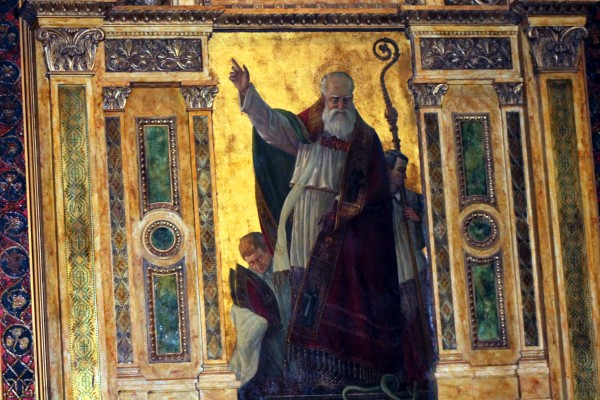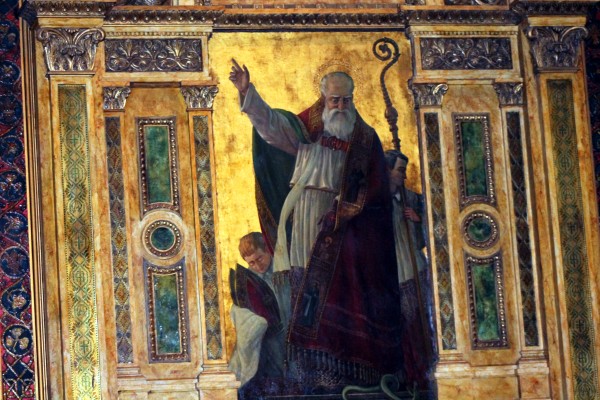Reactions to Firing of Gays at Catholic Institutions
February 12, 2014

According to Rev. Robert R. Grimes, S.J., dean of Fordham College at Lincoln Center (FCLC), and Associate Chair of Undergraduate Studies in Theology Karina Hogan, the firing of gay married employees would never happen at Fordham, despite it happening at other Roman Catholic schools in Arkansas, California, Massachusetts, New York and elsewhere.
“There’s no stipulation in a Fordham contract with anything related to that,” Grimes said, who nonetheless emphasized the difference between civil marriage and the Catholic sacrament of matrimony. “In Catholic teaching, the very nature of the sacrament has two functions. One is unitive: two people coming together in a loving relationship. And the other is procreative,” Grimes said.
Hogan said she could not fathom anything of this nature happening at Fordham where she feels there is a “much more elevated and rational discourse that goes into the decision making.”
Fordham’s past supports Hogan’s idea that Fordham has an elevated discourse. In April of 2010, after a four-year battle between the Salary and Benefits Committee of the Faculty Senate and Fordham administration, Fordham extended faculty health benefits to legally domiciled adults (LDA). An LDA shares a primary residence with the faculty and is either a tax dependent blood relative defined by Section 152 of the Internal Revenue Code or “has a close personal relationship with the employee.” This move predated the passage of same-sex marriage in New York state by over a year.
Also, Fordham’s policy is in accordance with federal, state and local law and does not discriminate against race, color, creed, sex, sexual orientation, nor marital or parental status, etc. Specifically, Fordham’s non-discrimination policy states “Fordham University does not knowingly support or patronize any organization that engages in unlawful discrimination.”
But the Catholic Church is an organization. At what point is the line drawn between religious freedom and unlawful discrimination?
Grimes explained that couples incapable of engaging in the marital acts, in the eye of the Catholic Church, are unable to marry “because it is so closely related to procreation. And therefore same-sex marriage is an oxymoron in the Catholic thought.”
In contrast, Hogan questions the general procreative arguments used by Catholics, and other religions, in regards to same-sex marriage.
“Does that mean that marriages that aren’t blessed with children, marriages that are infertile or people marrying when they are too old to have children or any other reason, does that make them any less valid as marriages if they marry in the Catholic Church?” she posited.
Hogan also pointed out that many gay couples marry because they want to have children, whether through adoption, surrogacy or other forms of procreation without the children being biological offspring of both parents.
“So I don’t think procreation works either way for defining marriage,” she said. “In fact, to get biblical for a minute,” Hogan continued, “the story in Genesis 2 that explains why people get married… doesn’t actually say anything about procreation.” Instead, Hogan clarified that Adam and Eve become one flesh, and while it “seems to be implying sex, it never says ‘and then they will have lots of babies.’”
Grimes said that the possibility of procreation is the only requirement in Catholic teaching. This can be found in Code of Canon Law, Canon 1061. However, it is not necessary for a child to result. He also said that he is not commenting on personal opinion but rather trying to explain traditional Catholic teaching on marriage.
Despite Pope Francis’ accepting words, “If someone is gay and he searches for the Lord and has good will, who am I to judge?” Grimes explained that “Pope Francis, when he was Arch Cardinal, apparently lobbied for same-sex unions over marriage” because of the procreative element in traditional Catholic teaching.
Hogan questions why these institutions wait until the gay or lesbian faculty chooses to get married until they fire them. “I find it puzzling because the Catholic Church is so affirming of marriage and these people are obviously in some sort of relationship before they get married…It calls into question on what grounds are they really objecting?” she asked.
Chris Hennessy, FCLC ’15 and member of Rainbow Alliance, wants to see the focus of LGBTQ (lesbian, gay, bisexual, transgender and queer) rights movement shift from marriage equality onto other issues like job security and protection from hate crimes. “The LGBTQ community as a whole has focused on making marriage equality the main issue. And it’s important, but problematic, because what happens is people think that once marriage has been granted, in any state, the fight is over. That’s not the case. This is a prime example of that.”
These firings “are dangerous, and have consequences not only for the teachers, but the students,” Hennessy said.
He explained that teaching is not a job that only affects the employee but the students as well. One of his major concerns deals with stripping away safe spaces for LGBTQ students that look up to these teachers, who may intend to follow in these teachers’ foot steps. “Think about the implications it has on LGBT students, and let’s not ignore LGBT youth suicide.”
Hogan also explored the issue from a student injustice perspective and said, “Why remove a teacher the students appreciate and are learning from and say because of their personal life, they are not qualified to teach here? It seems contrary to the whole spirit of the equal opportunity laws,” she said.
The Catholic religion opposes same-sex marriage. These other, mainly high school, Catholic institutions, in abiding by their religion, have their faculty sign contracts stating they will abide by the Church’s teaching.
According to the American Civil Liberties Union, it is currently legal to fire or refuse to hire someone based on sexual orientation in 29 states. Transgender employees can be fire based on gender identity alone in 33 states. The Employment Non-Discrimination Act, under religious freedom, deems LGBTQ discrimination as more viable than discrimination based on other factors, like employees’ race.
Anastasia Coleman, director of Institutional Equity & Compliance Title IX Coordinator, refused to comment on other institutions specific actions.












